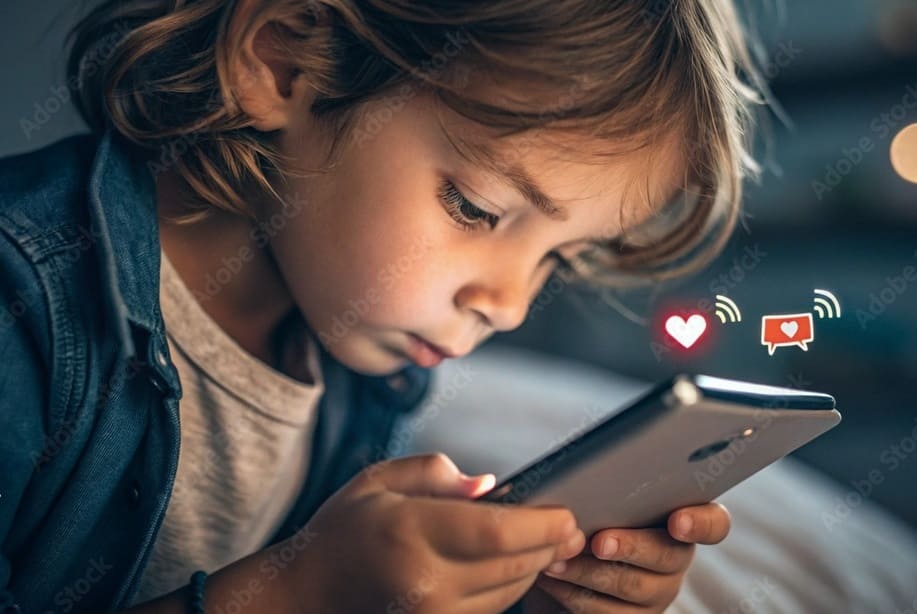Social media has become an inseparable part of modern life, and children are no exception to its influence. From TikTok challenges to Instagram reels and YouTube shorts, kids today are growing up in a world where digital interactions often take precedence over real-life experiences. But can excessive social media use negatively impact a child’s mental growth? The short answer: Yes, it can. Let’s explore how.
Impact of Social Media on Children’s Cognitive and Emotional Health
Children’s brains are in a crucial stage of development, especially in areas related to focus, memory, and problem-solving. Excessive social media usage can contribute to:
- Reduced Attention Span: Quick, engaging videos and constant notifications train the brain to seek instant gratification, making it harder for kids to concentrate on tasks requiring sustained attention, such as reading or studying.
- Weakened Critical Thinking Skills: With an overload of easily digestible information, children may struggle to analyze content deeply or develop independent opinions.
- Sleep Disruptions: Blue light exposure and the addictive nature of social media can lead to irregular sleep patterns, affecting overall brain function and cognitive development.
- Diminished Academic Performance: Spending excessive time on social media can lead to decreased motivation for schoolwork and lower academic achievements, as children may prioritize online engagement over learning.
Emotional and Psychological Effects
Beyond cognitive aspects, excessive social media use can take a toll on a child’s emotional well-being:
- Increased Anxiety and Depression: Constant exposure to curated and often unrealistic online personas can lead to self-esteem issues and feelings of inadequacy.
- Cyberbullying Risks: Online interactions are not always positive, and many children experience bullying or social rejection in the digital space, impacting their mental health.
- Reduced Social Skills: Spending more time online can limit face-to-face interactions, making it harder for kids to develop crucial interpersonal skills like empathy and conflict resolution.
- Addiction and Dependency: The dopamine-driven feedback loops of social media can lead to compulsive behavior, making it difficult for children to disengage and focus on other activities.
- Fear of Missing Out (FOMO): Seeing peers post about their experiences may create feelings of exclusion and dissatisfaction with their own lives, leading to emotional distress.
Physical Health Implications
Excessive social media use is not just a mental concern but also impacts physical health:
- Poor Posture and Eye Strain: Prolonged screen time can cause eye fatigue, headaches, and posture-related issues due to continuous slouching.
- Sedentary Lifestyle: Excessive screen time reduces physical activity, contributing to obesity and related health problems such as diabetes and heart disease.
- Disrupted Eating Habits: Mindless scrolling during meals can lead to unhealthy eating patterns, including overeating or skipping meals.
How to Strike a Healthy Balance
While social media isn’t inherently bad, moderation is key. Here are some ways to ensure a healthy balance:
- Set Time Limits: Encourage a structured routine where social media use is limited to specific times of the day.
- Promote Offline Activities: Encourage hobbies, outdoor play, and family interactions to create a more well-rounded lifestyle.
- Educate About Healthy Usage: Teach children about the potential pitfalls of social media, including privacy concerns and the importance of digital detoxing.
- Encourage Open Conversations: Talk to children about their online experiences and any negative emotions they may feel due to social media.
- Use Parental Controls: Utilize tools and apps that help monitor screen time and limit access to harmful content.
- Lead by Example: Parents and guardians can set a positive precedent by managing their own social media usage mindfully.
Final Thoughts
Social media is a double-edged sword—it can be an avenue for creativity and learning, but when overused, it can hinder a child’s mental growth. By fostering mindful and balanced usage, we can help children navigate the digital world while ensuring their cognitive, emotional, and social development remains on track. Parents, educators, and caregivers play a crucial role in guiding children toward a healthier digital lifestyle, ensuring they harness the benefits of technology without falling into its traps.
Also Read:
